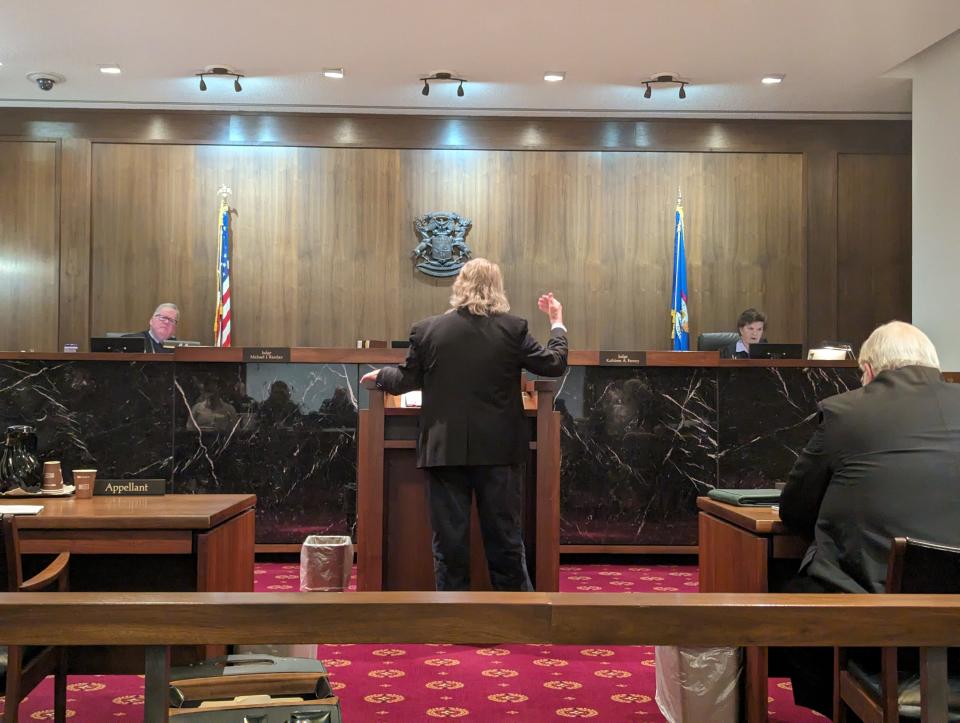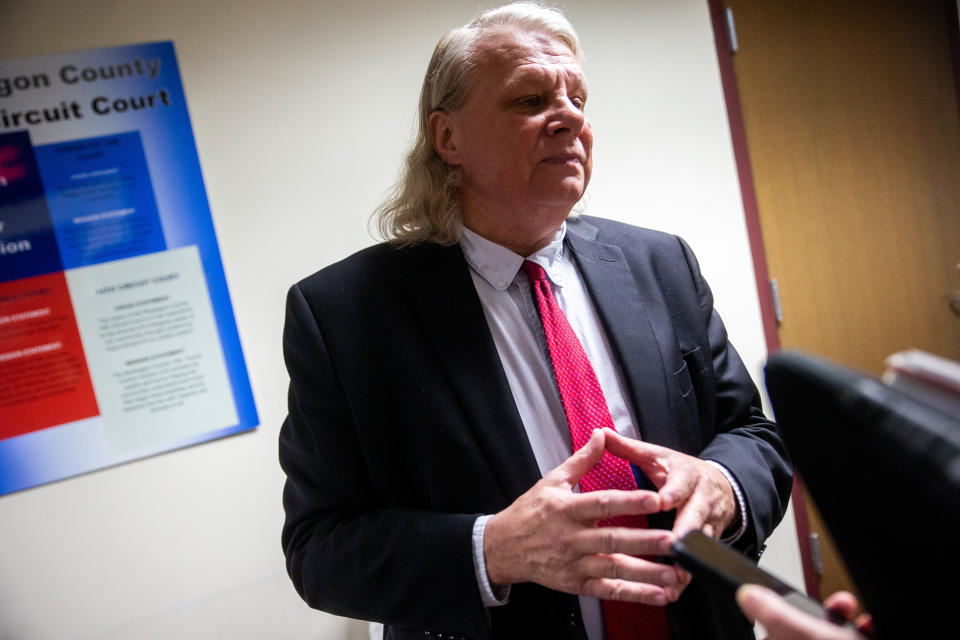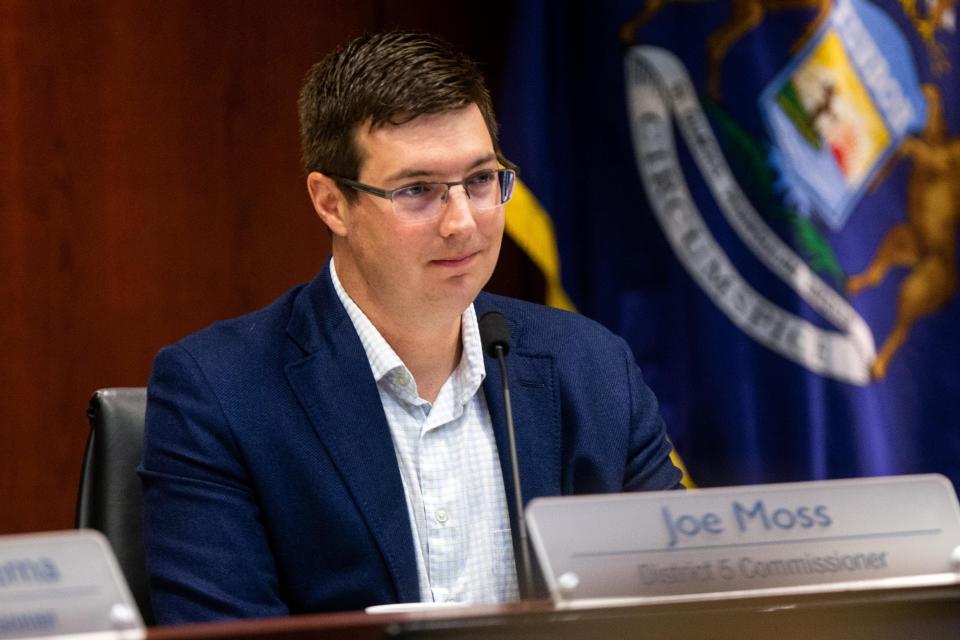Appeals court rules Ottawa Impact didn't violate Open Meetings Act last year
GRAND RAPIDS — The Michigan Court of Appeals has unanimously ruled that a Muskegon County circuit court judge didn't make a legal error when he dismissed a lawsuit against the Ottawa County Board of Commissioners alleging violations of the Open Meetings Act.

The lawsuit was filed in March 2023 and alleged that the commission's Ottawa Impact majority violated Michigan's OMA in its inaugural meeting in January 2023. During that meeting, commissioners added several items to the agenda and took what seemed to be pre-orchestrated actions against the county administrator, health officer, Diversity, Equity and Inclusion department and corporation counsel.
The plaintiffs — four county residents — argued Ottawa Impact electees were a de facto public body subject to OMA beginning Nov. 9, 2022 (the day after the general election) because, during that period, they constituted a quorum of the board and exercised governmental authority over county employees, even though they were not yet sworn into office.

Joe Moss founded the far-right fundamentalist group in 2021 after he took issue with pre-K-6 school mask mandates during the COVID-19 pandemic. He launched the political action committee under the premise of "defending parental rights" and to "thwart tyranny" within the state and federal government.
The plaintiffs claim the commissioners "failed to inform the people of Ottawa County of the governmental decisions" they made between Nov. 8 and Jan. 3, their attorney Mark Brewer of Goodman Acker said early last year. "The people of Ottawa County were denied their right to petition the government."
OMA requires public bodies to make decisions in public, with some limited exceptions for closed sessions. Any meetings involving a "quorum" of the board, the minimum number of members required to vote, must be held in public, and notice and an agenda must be provided.

Supporters of Ottawa Impact argue the commissioners weren't technically office-holders before Jan. 3, and therefore couldn't have violated OMA, even if they met or made decisions prior to taking office — including naming a chairman and selecting new counsel.
"You don't take a position or hold the power until you take the oath of office," board counsel David Kallman, of Kallman Legal Group, said early last year. "There are no de facto legislators. You are either in the position, or you're not in the position. Our clients had no authority or power to act prior to Jan. 3. This is an absurd argument."
In a written opinion July 14, 14th Circuit Court Judge Matthew R. Kacel agreed, saying an individual or group becomes a public body for the purposes of OMA "only when it is 'empowered' to exercise government authority or perform a government function by 'a state constitution, statute, charter, ordinance, resolution or rule.'"
Brewer appealed on July 17.
He argued Wednesday, Jan. 3 — exactly one year after the meeting in question took place — in front of the Michigan Court of Appeals, saying Kacel erred because he made "fact findings" in his written opinion with no evidence taken into the record for him to rule on.
More: Court of Appeals hears arguments in Open Meetings Act violation suit
Brewer said the lower court should have allowed discovery — the formal process of exchanging information between the parties about the witnesses and evidence they will present at trial — and then ruled on the county's motion to dismiss.
"The judge didn't have any evidence on record — only our pleadings," Brewer said in court Jan. 3.
The judges presiding — James Robert Redford, Michael J. Riordan and Kathleen J. Feeney — acknowledged Brewer had a novel legal theory, but ultimately didn't agree.
"We conclude that the trial court did not err by granting defendant’s motion for summary disposition of plaintiffs’ complaint without allowing an opportunity for discovery," a Jan. 25 written opinion said.
"Not only did plaintiffs fail to allege in their complaint that a public body subject to the OMA delegated the exercise of governmental authority to the Ottawa 9, they also failed to identify how additional factual development would establish that such delegation had occurred," the opinion said. "We conclude that the trial court did not err by determining that the OMA did not apply to the Ottawa 9 before they were seated on January 3, 2023, because, up to that point, they did not constitute a public body for purposes of the OMA."
Brewer told The Sentinel on Friday that he was disappointed by the decision.
"They miss the forest for the trees. This was a massive evasion of the Open Meetings Act on a scale I've never seen by a group of incoming people," he said. "And the scale of the decisions they made — they fired people, they hired people, they abolished programs. Then they simply rubber-stamped all those secret decisions when they took office record. (The judges) ignored all of that — they ignored the reality of what occurred here, that all that business should have been done in public."
Brewer said he is discussing with his clients about the possibility of appealing to the Michigan Supreme Court. He said he has grave concerns over the precedent the ruling sets.
Subscribe: Get all your breaking news and unlimited access to our local coverage
"What we're very concerned about here is not only what is wrongdoing in Ottawa County, but if this is permitted, it's a blueprint for every other incoming group of elected officials to do exactly the same thing," he said. "It'll spread like wildfire across the state. It'll become the newest evasion of the Open Meetings Act, because this cannot be permitted."
He said case law has established that the OMA statute is intended to be "liberally construed" and that it's "designed to be construed to avoid evasions just like this. I mean, this was so blatant, and so open, and the court, unfortunately, has allowed them to get away with it."
— Sarah Leach is executive editor of The Holland Sentinel. Contact her at sarah.leach@hollandsentinel.com. Follow her on Twitter @SentinelLeach.
This article originally appeared on The Holland Sentinel: Appeals court rules Ottawa Impact didn't violate Open Meetings Act

